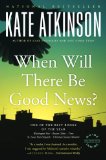Summary | Excerpt | Reading Guide | Reviews | Beyond the Book | Readalikes | Genres & Themes | Author Bio

A Novel
by Kate AtkinsonHarvest
The heat rising up from the tarmac seemed to get trapped between the thick hedges that towered above their heads like battlements.
"Oppressive," their mother said. They felt trapped too. "Like the maze at Hampton Court," their mother said. "Remember?"
"Yes," Jessica said.
"No," Joanna said.
"You were just a baby," their mother said to Joanna. "Like Joseph is now." Jessica was eight, Joanna was six.
The little road (they always called it "the lane") snaked one way and then another, so that you couldn't see anything ahead of you. They had to keep the dog on the lead and stay close to the hedges in case a car "came out of nowhere." Jessica was the eldest so she was the one who got to hold the dog's lead all the time. She spent a lot of her time training the dog, "Heel!" and "Sit!" and "Come!" Their mother said she wished Jessica were as obedient as the dog. Jessica was always the one who was in charge. Their mother said to Joanna, "It's all right to have a mind of your own, you know. You should stick up for yourself, think for yourself," but Joanna didn't want to think for herself.
The bus dropped them on the big road and then carried on to somewhere else. It was "a palaver" getting them all off the bus. Their mother held Joseph under one arm like a parcel and with her other hand she struggled to open out his newfangled buggy. Jessica and Joanna shared the job of lifting the shopping off the bus. The dog saw to himself. "No one ever helps," their mother said. "Have you noticed that?" They had.
"Your father's country-fucking-idyll," their mother said as the bus drove away in a blue haze of fumes and heat. "Don't you swear," she added automatically. "I'm the only person allowed to swear."
They didn't have a car anymore. Their father ("the bastard") had driven away in it. Their father wrote books, "novels." He had taken one down from a shelf and shown it to Joanna, pointed out his photograph on the back cover, and said, "That's me," but she wasn't allowed to read it, even though she was already a good reader ("Not yet, one day. I write for grown-ups, I'm afraid," he laughed. "There's stuff in there, well . . .").
Their father was called Howard Mason and their mother's name was Gabrielle. Sometimes people got excited and smiled at their father and said, "Are you the Howard Mason?" (Or sometimes, not smiling, "that Howard Mason," which was different, although Joanna wasn't sure how.)
Their mother said that their father had uprooted them and planted them "in the middle of nowhere." "Or Devon, as it's commonly known," their father said. He said he needed "space to write" and it would be good for all of them to be "in touch with nature." "No television!" he said as if that was something they would enjoy.
Joanna still missed her school and her friends and Wonder Woman and a house on a street that you could walk along to a shop where you could buy The Beano and a licorice stick and choose from three different kinds of apples instead of having to walk along a lane and a road and take two buses and then do the same thing all over again in reverse.
The first thing their father did when they moved to Devon was to buy six red hens and a hive full of bees. He spent all autumn digging over the garden at the front of the house so it would be "ready for spring." When it rained the garden turned to mud and the mud was trailed everywhere in the house; they even found it on their bedsheets. When winter came, a fox ate the hens without them ever having laid an egg and the bees all froze to death, which was unheard of, according to their father, who said he was going to put all those things in the book ("the novel") he was writing. "So that's all right, then," their mother said.
Their father wrote at the kitchen table because it was the only room in the house that was even the slightest bit warm, thanks to the huge temperamental Aga that their mother said was "going to be the death of her." "I should be so lucky," their father muttered. (His book wasn't going well.) They were all under his feet, even their mother.
Copyright © 2008 by Kate Atkinson




Everywhere I go, I am asked if I think the university stifles writers...
Click Here to find out who said this, as well as discovering other famous literary quotes!
Your guide toexceptional books
BookBrowse seeks out and recommends the best in contemporary fiction and nonfiction—books that not only engage and entertain but also deepen our understanding of ourselves and the world around us.